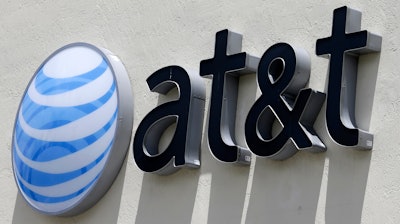
NEW YORK (AP) — AT&T's pending acquisition of Time Warner, an $85 billion media deal that could shake up how Americans watch TV, is being held up by the government. That's raising red flags for some who worry that the White House is trying to put pressure on CNN, the news network owned by Time Warner.
The Justice Department told AT&T that it wanted the telecom company to sell its DirecTV satellite unit or Time Warner's Turner, which houses CNN, TBS and TNT, to get the deal approved, said a person familiar with the situation, who was not authorized to speak publicly.
According to a Justice Department official, AT&T has offered to divest CNN. The official, who was not authorized to discuss the matter publicly, said the department rejected that offer as insufficient to resolve its concerns, which it did not specify.
AT&T CEO Randall Stephenson said in a statement, "I have never offered to sell CNN and have no intention of doing so." An AT&T spokesman did not respond to other questions, although one company executive told an investor conference Wednesday that timing of the deal is "uncertain."
The deal's holdup has raised suspicions of political retaliation — even from people who oppose the deal entirely. As a candidate, Donald Trump vowed to block the deal because it concentrated too much "power in the hands of too few." As president, Trump has often blasted CNN for its coverage of him and his administration, disparaging it and its reporters as "fake news."
"While there are plenty of good reasons to oppose AT&T's Time Warner takeover, punishing CNN for trying to hold this administration accountable isn't one of them," Free Press' president, Craig Aaron, said in a statement. The consumer group opposes the deal and media consolidation in general.
Sen. Brian Schatz, a Democrat from Hawaii, tweeted that "Presidential power must be used wisely and fairly. I don't know the details here but this is worth investigating."
"Are we really going to make the (Justice Department) use antitrust law to force the sale of a cable channel because the President doesn't like its news coverage?" tweeted Jessica Rosenworcel, a Democratic member of the Federal Communications Commission. "You can dislike consolidation but still find this extremely disturbing if true."
In an email provided by a DOJ spokeswoman, White House spokesman Raj Shah said that Trump "did not speak with the attorney general about this matter," and that "no White House official was authorized to speak with the Department of Justice on this matter." In a separate statement, DOJ's new antitrust chief, Makan Delrahim, said he has "never been instructed by the White House on this or any other transaction under review by the antitrust division."
Time Warner shares dropped 6.5 percent to $$88.50 Wednesday. AT&T stock closed up 1.1 percent at $33.44.
If AT&T and DOJ cannot agree to conditions, the government can sue to block the deal. The Justice official said no decision on the deal has been reached yet and that conversations continue.
AT&T had previously targeted the end of the year for closing the deal, and Wall Street analysts had widely expected the deal to go through. Obama-era regulators in 2011 approved a similar media merger, cable company Comcast's purchase of NBCUniversal, after Comcast agreed to a slew of business requirements.
Delrahim has said he prefers "structural" changes to a deal, like selling off assets, rather than having the government monitor a company's promises to abide by certain conditions, as was done with Comcast. Requiring AT&T to sell either Turner or DirecTV would be in line with Delrahim's thinking.
AT&T hopes to benefit from marrying all of Time Warner's assets to its own. It would then supply its video — HBO, CNN, TBS and the Warner Bros. movie studio — while providing access to the internet for millions of Americans.
Consumer groups, some TV networks and some conservative groups have criticized the deal, saying it would hurt consumers by allowing AT&T to discriminate against TV networks it doesn't own or raise prices on other cable and satellite TV companies for its programming. Several Democratic lawmakers have also pushed back against the combination.
Forcing a sale of CNN could harm the news network, if a buyer doesn't have the same deep pockets as AT&T and Time Warner to support newsgathering.
Being forced to sell off Turner is probably a "nonstarter" for AT&T, New Street Research analyst Jonathan Chaplin said. He said the company has "very good" prospects of winning in court against the Justice Department. "It's difficult to imagine an antitrust argument that will be compelling" from the government, he said.
AT&T has long noted that "vertical mergers" — when one company buys another that isn't a direct competitor — are typically approved.
In an emailed statement, the Justice Department said that it "is committed to carrying out its duties in accordance with the laws and the facts. Beyond that, the Department does not comment on any pending investigation."






















